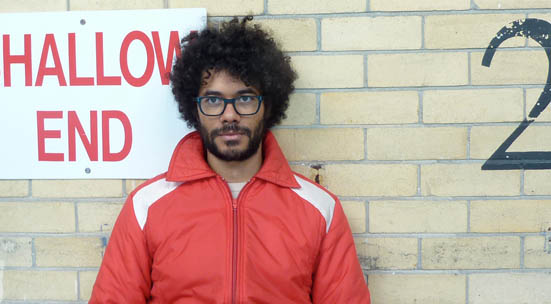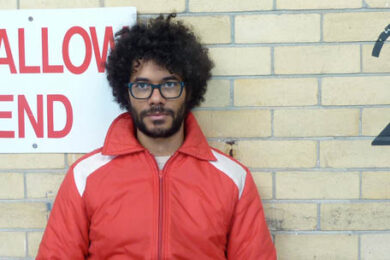"A film director is one of the last truly dictatorial posts left in a world that is becoming more and more democratic." So said Francis Ford Coppola after the filming of Apocalypse Now. If this view still holds any water, it is difficult to imagine Richard Ayoade in a personalized fold-out chair, with a megaphone in his hand and politely shouting ‘ACTION!’ in the direction of the set.
Ayoade is best known as Moss in The IT Crowd, a computer technician with the social skills of a genet: easily startled but inquisitive and ultimately domesticable. Some of these character traits are, if not present, recognizable in Ayoade himself; he comes across as anything but dictatorial. He is charming but modest; humbly accepting of praise, but quick to palm it off in other directions; scales any excitement down by a factor of ten; and is unaware of why some may privilege his thoughts on his debut feature Submarine above anybody else’s. At times he is so self-effacing it is impossible to imagine him in a development meeting, surrounded by suited film execs, pitching for millions of pounds to fund his project.
Fortunately for Ayoade, Warp Films are not your average production company, and they saw enough talent in his music video work to offer him the helm on an adaptation of Joe Dunthorne’s coming of age novel; the story of precocious, dictionary reading Oliver Tate, a teenager who doesn’t want to let his principles stand in the way of progress. And it is a good thing they did, as Submarine arrives as a subtle, cinephilic and funny film that has the assurance of a director who fully understands his craft.
The Quietus caught up with Richard after nearly a year’s worth of press work promoting the film – a circuit that must have been difficult for someone who confesses to being socially awkward. "I think it’s probably hard for people to become aware of things unless there are famous people talking about a film," he says. "Unless it’s a genre film I suppose, but for smaller independent films, it seems like the only route for people to find out about it." The first five minutes of our chat was a little stilted, demonstrating he is still coming to terms with his newfound position at the centre of attention. But as he relaxes, he becomes an amiable, if slightly hesitant subject.
It is a film well worth the laudable promotion effort Ayoade has put in, and indeed one you sense the director is proud of, although you would be hard pressed to make him admit it. He prefers to give credit to others involved in the project. For example, he emphasizes Paddy Considine’s input to the brilliantly insane character, Graham T. Purvis: "[Paddy] was completely in control, because you can’t ever really force an actor to do something they don’t want to. Not really, I don’t think. So there were guidelines, but with someone like Paddy, who’s such a good writer anyway, you want them to be as involved as they’d like to be." Ever the democrat, never the dictator.
Considine’s character Graham is a self-help guru, replete with leather trousers and electro-shocked mullet, with a method that categorises personality according to a colour spectrum. The outfit and the bravado have hints of Tom Cruise’s Frank T. J. Mackey in P.T. Anderson’s Magnolia, a comparison Ayoade acknowledges but plays down: "I guess there are quite a few Tom Cruise scientology videos, so there’s a kind of crossover there with the actor. I love Magnolia, so I couldn’t not be aware of Magnolia, but in terms of Paddy’s performance, I’m not exactly sure what he would say influenced his role."
Graham is also Oliver’s nemesis. But if Oliver recoils from Graham’s ‘mystic bullshit’, Ayoade revels in the cheesiness, filming a pitch-perfect version of Graham’s self-released VHS (available in full in the DVD extras), that flits and crackles over the screen like that battered tape of Back to the Future you can’t quite stand to throw away. It’s a nostalgic aesthetic he has used before, particularly in Garth Marenghi’s Darkplace, an excellent 1980s horror spoof he co-wrote, directed and starred in for Channel 4 (Ayoade played Marenghi’s camp publisher, Dean Learner, one of his earliest comic creations.)
Faithfully recreating such period-specific effects takes great technical knowhow, an aspect of the filmmaking process Ayoade enjoys: "I’m pretty involved with the technical aspects. I guess you don’t really end up subdividing it too much, as it really depends what the specific problem in front of you is, and different sequences have greater technical demands than others, and they’re all really interrelated. I’m not brilliant at categorising those things really … I know where the focus pull is, but I probably wouldn’t be able to work one of those electronic focus pull docks myself. I could talk about aperture, though."
VHS tapes are one of a few 1980s signifiers in the film (characters also go to see Crocodile Dundee), but these touchstones stand out like islands on an otherwise timeless surface that undulates between the fifties and the nineties. "Crocodile Dundee feels to me like quite an old film, anyway, like a fifties, fish out of water Frank Capra story, which I quite like," he explains. "But unless you have a large amount of money to control things, you can’t stop the modern world impacting on what you’re filming. So I wanted it to be non-specific. Also, I thought Crocodile Dundee was the type of film that might have had an extended run. I remember Beverly Hills Cop played for about 7 years in Ipswich."
The music has all been composed specifically for the film, which adds to the difficulty in placing it. Arctic Monkey Alex Turner wrote a collection of solo songs for the project, whilst Andrew Hewitt, a regular collaborator of Ayoade’s, composed a more conventional score. This was something Ayoade planned early on: "I wanted there to be two types of music. One an orchestral, internal score, inside Oliver’s head, which would be like Georges Delerue. And then for the songs, it just seems like they have a lot of information attached to them if they pre-exist, or they certainly can, and I guess particularly with these types of films. And even for a while we were thinking of having Alex do covers of some John Cale songs, but it was just great that he could end up writing a whole batch of new songs, so I was really happy for that to happen."
After such an impressive debut, one would expect the offers to be rolling in for Ayoade. In typical fashion, though, he is very cautious about the future: "Unless you’re in a very particular position it’s probably unlikely that you’ll get to make films regularly enough for that to be the only thing that you did. So it’s likely that some other things will happen, but as to what they are I’m not sure really." However, he is already working on an adaptation of Dostoevsky’s novella The Double, co-written with Avi Korine, which he feels is going well "at the moment", and he bagged a guest director slot on the excellent NBC sitcom Community last year – a role Ayoade insists was purely down to nepotism, and nothing to do with his own obvious talent or appropriateness (the episode features a parody of My Dinner with Andre by Louis Malle, one of Ayoade’s favourite director’s). He makes out Joel McHale, the show’s star, bullied the producers into giving him the slot: "it was through Joel really, because I did a pilot of The IT Crowd for America, and he was in it. So we kept in touch, and I think he probably just persuaded them to let me direct an episode." He laughs at the suggestion the producers of a hit show might just have done some research before offering him the job: "Oh, well, they’re easily influenced."
Richard Ayoade will never be one to blow his own megaphone; indeed he has little in common with the classic image of the director as general that Coppola described all those years ago. However much he may attempt to persude you otherwise though, he possesses great cinematic talent, and Submarine is perhaps a testament to a focused vision and a more understated modus operandi, one where you are actually nice to people and don’t throw a tantrum because your cappuccino isn’t frothy enough.



